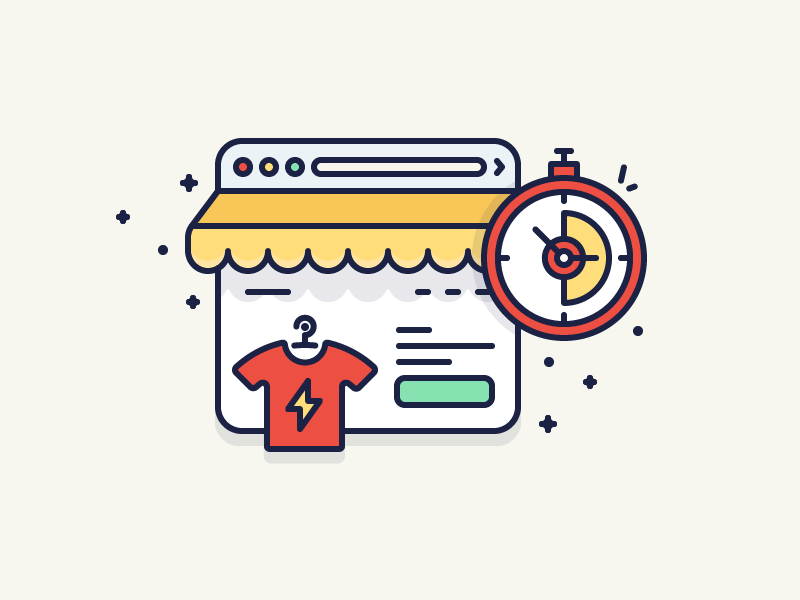How I Launched My eCommerce Store in Less than 30 Minutes
Key Takeaways
- Setting up an eCommerce store can be done in less than 30 minutes. Key steps include picking a name, creating a Shopify account, fine-tuning settings, adding products and categories, adding content, and designing the store.
- The author recommends using the dropshipping model for new businesses to save on costs and reduce risks. This model allows you to add products to your store and only pay the supplier after a product is sold.
- The author emphasizes the importance of learning and creating along the way. Instead of focusing on creating a perfect store from the start, it’s more productive to launch a simple store and improve it over time.
- Even after launching the store, continuous improvement is necessary. This includes improving sales, customer service, customer experience, and personal growth as an entrepreneur.

I’ll be honest, I tried to launch my first store for 12 months! I followed the usual way to begin with.
I incorporated myself, looked for wholesalers, underestimated my marketing budget need, developed a great looking store, manually added thousands of products, …
… and never made a sale.
Today, after just selling my eCommerce project with $3M annual sales and 7 eCommerce stores in my CV, I understand what I did wrong and found a way to fix it.
I did what most people do — I concentrated too much on creating a great looking store instead of actually trying to make a sale.
People think that if you are launching an eCommerce business that you should do it the hard way. They think that you should never launch a poorly developed store, or that you should try to land a super deal with a wholesaler long before making any actual sales.
But what I have found is that it’s much more productive to learn and create along the way. Your first step is to simply create you store. Once your store is up and running, you can explore ad campaigns and logo designs at a later time.
As my favorite quote says: “Get going, get better”.
Below I’m sharing a detailed tutorial on how you can launch your first eCommerce store in under 30 minutes with dozens of products. It won’t be perfect, but it’ll be exactly what you need to get going.
In this example, I will build a full category women’s clothing shop that sells non-branded funky clothes. I strongly suggest that you follow the guide as it is written and try implementing additional features and ideas later after your launch.
Set Up a Store (~5 minutes)
1. Pick a Name
Picking a name shouldn’t be a huge concern right now. Think of something random and simple. For my women’s clothing shop I came up with: Forest Store, Hill Hill Store, MarsIn1999.
I recommend adding ‘store’ or ‘shop’ because you will need to find an available internet address (domain), and it’s easier to find an available one when there are several words in the name.
2. Create a Shopify Account
In the olden days, you had to get a server, upload an eCommerce system to it, hire someone to change it according to your needs, and pay to maintain it. It was expensive, time consuming, and the final result was still a slow and ineffective website.
Thankfully, Shopify and other alternative softwares has simplified the process. You can create your store in just a few clicks and all of the server setup and maintenance is taken care of for you.
Go to Shopify.com, click ‘start your free trial’, enter your store name, and create your shop.
Your store is now ready!
3. Fine Tune Your Settings
3.1. Add Your Store Payment Option
Add your PayPal email address under the Shopify Settings, Payments Section. Later, you can change, remove, or add additional payment options.
If you don’t have a PayPal account, registration at PayPal.com will take about 5 minutes.
3.2. Generate Required Policies
Shopify offers a handy tool for generating terms and conditions, standard privacy, and return policies. Just go to Shopify Settings, Checkout, and scroll down to the Refund, Privacy, and TOS statements section to generate each policy sample.
3.3. Add Free Shipping Rate
The sourcing tool I will recommend to you will offer most of the products with a free delivery option. So I suggest adding a free shipping rate for all of your orders as well.
Go to Shopify Settings, Shipping, and delete all shipping zones that are non-international, and edit the international zone rate to Free.
3.4. Create an Online Store
Shopify allows you to sell your products across multiple channels like Online Store, Facebook Store, Brick and Mortar store, etc.
We want to create an online store now. Go to Shopify Settings, Sales Channels and add Online Store as your sales channel.
3.5. Buy a Domain (Optional)
Buying a domain is optional. Currently, your URL looks like [storename].myshopify.com. But you might want to change it so it will look more normal: [storename].com.
You don’t have to do this right away, and there will be a cost (about $13 per year). You can set this up later once you decide if you want to invest further money into your business.
It is important to note, however, that a custom internet address provides social accountability when you start advertising your site, which can increase your sales significantly.
To buy a domain, go to Shopify Online Store, Domains Section, and click Buy New Domain.
P.S. You’ll need to confirm the domain before it starts working. The confirmation letter is in your email inbox.
Add Products and Categories (~10 minutes)
A traditional eCommerce model can work like this: first you buy several hundred products, wait for them to be delivered, stock them in your garage or a small warehouse, and when someone places an order you ship them to your customer.
This traditional model works well for bigger companies, but for new companies, this model can have extra costs (storage space), risks (unsold stock), and annoyances (not having a popular item in stock and ready to ship).
There is an alternative to this model: the dropshipping model. Dropshipping allows you to save time and money by buying a product only after you sell it in your store.
You simply add products to your store, and when an item sells, you pay the supplier who then ships it directly to your customer. There is no need to pay for extra storage space and no need to worry about what to do with unsold stock.
We’ll focus only on dropshipping because the other option requires extra capital, time and effort. There are two ways to obtain dropshipped products for your store:
- Contact wholesalers and land a dropshipping deal. You will soon realize that it is hard to find good suppliers who provide dropship services. If you find a company, they will usually only do business with an established, profitable business. This is not the best option for a startup business.
- Use sourcing tools and apps. You connect your store with the app (see recommendation below) and import products directly from a dropshipped products database within minutes.
There are several dropshipping apps, but I would suggest downloading the free trial from Ali Importer.
Ali Importer is an app that allows you to import dropshipped products from AliExpress to your store within minutes. Items sold in your store will be shipped directly to your customers in just a few clicks. AliExpress offers a wide variety of products at very low prices, which is why it is an ideal partner in the beginning when you launch your store.
Here’s how we’ll use it:
1. Create categories
Product categories are called collections on Shopify. I’ll be selling women’s clothing so my collections will be (from top to the bottom): Hats, Shirts, Jackets, T-Shirts, Hoodies, Pants, and Accessories.
Just go to Products, Collections, Add New Collection, and then enter your collection name and select your collection conditions.
2. Install Ali Importer App and Add Products
Adding products with Ali Importer is simple. There are several different import methods, but the fastest way to do this is to go to the Ali Importer Featured Categories page and import entire product categories.
The video below shows me installing the application from the Shopify App Store and importing a featured category of women’s clothing.
Alternatively, you can just use the in-app search and import products individually, one by one.
Add Content (~5 minutes)
Content is extremely important. This is an area that you should focus on and spend more time on in the future.
However, the following sections should be enough to start with: About Us, Terms and Conditions, Privacy and Returns Policy, Shipping & Delivery Information, Track Your Order link, and Contact Us.
To create a page, go to Shopify Online Store, Pages, and click Add Page.
1. About Us
This page eventually needs to be unique, but this will take quite a bit of time. In the meantime, copy and paste one of the pre-generated ‘About Us’ pages from the list below and edit it to suit your store later.
2. Shipping & Delivery Information
Most of the sellers on Ali Importer have very similar delivery prices and timeframes, so it is best to copy and paste this standardized shipping & delivery page.
Shipping Information Page Templates ->
3. Terms & Conditions and Policies
You may remember that these pages were generated during the first step of this tutorial. Simply copy them from your settings page and paste into separate articles.
4. Contact Us
Keeping in close contact with your customers is very important. Make sure you place a clearly visible ‘Contact Us’ link on your store.
To create a contact page, click the Add New Page button and change the page template to contact.
Design Your Store (~10 minutes)
Shopify automatically assigns a default theme to your store and it already looks great, so you do not need to change this unless you want to spend the time to customize it. A customized site can help enhance your brand, but it is not necessary to do that when first launching the store.
1. Create Menu/Navigation
Go to the Shopify Online Store, Navigation section, select edit ‘Main Menu’ card, and list all your collections there.
2. Upload Main Banner
You can create a cool looking banner in just a few minutes. Google ‘banner editing tools’ or click here: Canva.com. Select banner dimensions (1200x360px), upload an image of one of your products, select background, insert a few lines of text, add a ‘Buy Now’ button, and you’re finished.
You can now insert this banner into your store by going to Online Store, Themes, Customize Theme, and editing Homepage Slideshow.
3. Editing Featured Products
Don’t exit the Customize Theme section and head to Home page and then Home page — featured collection subsection. There you can select which products to show under the main banner.
4. Setting Up Your Footer
You can find Footer Settings in Online Store, Themes Section, Customize Theme page, and Footer Settings. There you can decide what you want to see in your footer menu. I usually hide ‘Latest News column’, because we don’t have any news yet.
Now go to Online Store, Navigation section, select Footer Menu, and list all the articles you created before:

Congratulations!
Congratulations, you have just launched your first store!
Although it didn’t take a long time, it is still an excellent achievement. You are now an entrepreneur, running your own store.
You should also remember that launching a store does not guarantee success. Owning a business is about trying to improve your sales, customer service, your customer experience, and most importantly, yourself.
Write down a list of things you want to achieve with your business, and begin the learning process. Begin by committing one hour every day so that you can further edit your website, find new ways to boost sales, and learn how to grow your business.
Frequently Asked Questions about Launching an Ecommerce Store
What are the key elements to consider when choosing a platform for my ecommerce store?
The choice of platform can significantly impact the success of your ecommerce store. Key elements to consider include ease of use, scalability, security, and cost. The platform should be user-friendly, allowing you to easily manage your store without requiring technical expertise. It should also be scalable to accommodate your business growth. Security is paramount in ecommerce to protect sensitive customer data. Lastly, consider the cost, including setup and maintenance fees, and ensure it fits within your budget.
How can I effectively price my products for my ecommerce store?
Pricing is a critical aspect of your ecommerce strategy. It should be competitive yet profitable. Consider factors such as the cost of goods, operational expenses, market demand, and competitor pricing. You may also consider employing dynamic pricing strategies, where prices are adjusted based on market conditions.
What strategies can I use to drive traffic to my ecommerce store?
Driving traffic to your ecommerce store can be achieved through various strategies. These include search engine optimization (SEO) to improve your store’s visibility on search engines, social media marketing to reach a wider audience, email marketing to engage with customers, and content marketing to provide valuable information to your audience.
How can I ensure a seamless checkout process in my ecommerce store?
A seamless checkout process can significantly improve customer experience and reduce cart abandonment. Ensure your checkout process is simple and quick, with minimal steps. Provide multiple payment options and ensure your site is secure to build customer trust.
How can I effectively manage inventory in my ecommerce store?
Effective inventory management is crucial to prevent stockouts or overstocking. Consider using inventory management software that can track your stock levels in real-time, predict future demand, and automate reordering processes.
How can I build customer trust in my ecommerce store?
Building customer trust is key to ecommerce success. Ensure your site is secure and displays security badges. Provide clear and detailed product descriptions, and include customer reviews and testimonials. Also, have a clear and fair return policy.
How can I optimize my ecommerce store for mobile users?
With the increasing number of mobile shoppers, it’s crucial to optimize your ecommerce store for mobile. Ensure your site is responsive, meaning it adjusts to fit different screen sizes. Also, ensure it loads quickly and the checkout process is easy on mobile.
How can I use analytics to improve my ecommerce store?
Analytics can provide valuable insights into your store’s performance. You can track metrics such as traffic sources, conversion rates, and customer behavior. These insights can help you make data-driven decisions to improve your store.
How can I handle returns and refunds in my ecommerce store?
Handling returns and refunds effectively can enhance customer satisfaction. Have a clear return and refund policy and make it easily accessible to customers. Also, make the return process easy and quick.
How can I differentiate my ecommerce store from competitors?
Differentiating your ecommerce store can give you a competitive edge. You can differentiate through unique products, superior customer service, competitive pricing, or a unique shopping experience. Also, focus on building a strong brand identity.
Tomas Slimas has recently sold his $3M dropshipping business and now helps store owners automate their dropshipping stores at Oberlo.





